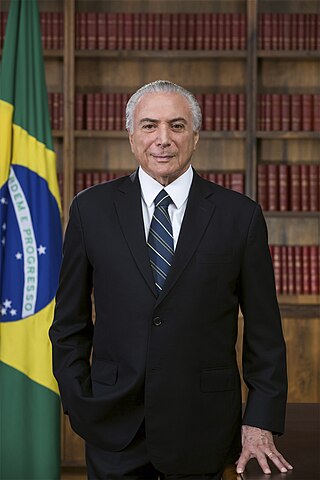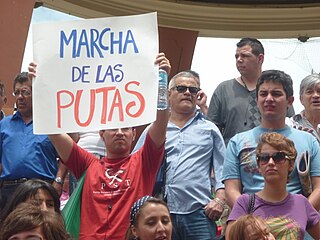Black feminism is a branch of feminism that focuses on the African-American woman's experiences and recognizes the intersectionality of racism and sexism. Black feminism philosophy centers on the idea that "Black women are inherently valuable, that [Black women's] liberation is a necessity not as an adjunct to somebody else's but because of our need as human persons for autonomy."

Antônia is a 2006 Brazilian drama musical film which tells the story of Antônia, an Afro-Brazilian hip-hop girl group formed by four young women living on a favela of São Paulo. On their way to the mainstream success, they have to face with the violence near their homes and the sexism of the musical business. The film was directed by Tata Amaral and stars Negra Li, Cindy Mendes, Leilah Moreno and Quelynah as the members of the group.
Domestic violence in Brazil involves any type of violence or abuse by intimate partners or family members against one another. The majority of domestic violence cases in Brazil are performed by the man against their female partners. In 2015, the government released a study that showed that every seven minutes a woman was a victim of domestic violence in Brazil, over 70% of the Brazilian female population will suffer some kind of violence throughout their lifetime and 1 in every 4 women reports being a victim of psychological or physical violence. In 2017, Brazil had an estimate of 606 cases of violence and 164 cases of rape per day, over 60 thousand cases throughout the year. It is also estimated that only 10% of the cases are registered to the police. Although Brazil acknowledged that domestic violence was a problem in the 1940s, the Government has only acted upon it from 1980s onwards, with the creation of the Women Police Stations and later in 2006, with the publication of the Domestic Violence law.

Michel Miguel Elias Temer Lulia is a Brazilian politician, lawyer and writer who served as the 37th president of Brazil from 31 August 2016 to 31 December 2018. He took office after the impeachment and removal from office of his predecessor Dilma Rousseff. He had been the 24th vice president of Brazil since 2011 and acting president since 12 May 2016, when Rousseff's powers and duties were suspended pending an impeachment trial.

SlutWalk is a transnational movement calling for an end to rape culture, including victim blaming and slut-shaming of sexual assault victims. Participants protest against explaining or excusing rape by referring to any aspect of a woman's appearance. The rallies began on April 3, 2011, in Toronto, Ontario, Canada, after a Toronto Police officer suggested that "women should avoid dressing like sluts" as a precaution against sexual assault. Subsequent rallies have occurred globally.

SlutWalks in Latin America were renamed "Marcha das Vadias" in Brazil and "La Marcha de las Putas" in most Spanish-speaking countries, sometimes using PUTAS as an acronym for "Por una transformación Auténtica y Social " Some countries like Argentina, Brazil, and Colombia were known to host simultaneous Slutwalks in different cities. In almost all countries, Slutwalks are repeated annually, although not always in the same cities. Some protests select their dates to match significant events such as the International Day for the Elimination of Violence against Women and the World Youth Day.

In 2015 and 2016, a series of protests in Brazil denounced corruption and the government of President Dilma Rousseff, triggered by revelations that numerous politicians allegedly accepted bribes connected to contracts at state-owned energy company Petrobras between 2003 and 2010 and connected to the Workers' Party, while Rousseff chaired the company's board of directors. The first protests on 15 March 2015 numbered between one and nearly three million protesters against the scandal and the country's poor economic situation. In response, the government introduced anti-corruption legislation. A second day of major protesting occurred 12 April, with turnout, according to GloboNews, ranging from 696,000 to 1,500,000. On 16 August, protests took place in 200 cities in all 26 states of Brazil. Following allegations that Rousseff's predecessor, Luiz Inácio Lula da Silva, participated in money laundering and a prosecutor ordered his arrest, record numbers of Brazilians protested against the Rousseff government on 13 March 2016, with nearly 7 million citizens demonstrating.
The first National Meeting of Black Women took place in Brazil from December 2 to December 4, 1988, in Valença, Rio de Janeiro. 450 women from 17 Brazilian states attended. The purpose of this meeting was to foster greater solidarity and organizational structure among black Brazilian women, particularly Fluminense women. Prior to the national meeting, the First State Meeting of Black Women of Rio de Janeiro occurred in 1987.

Aparecida Sueli Carneiro Jacoel, best known as Sueli Carneiro is a Brazilian philosopher, writer and anti-racism activist. Carneiro is the founder and current director of Geledés — Instituto da Mulher Negra and a leading author on black feminism in Brazil.

Laudelina de Campos Melo was an Afro-Brazilian activist, labor organizer and community worker. A domestic worker for most of her life, she recognized early in life the discrimination against and undervaluation of working women. Throughout her life, she strove to change public perception and policy vis-à-vis domestic workers, and was successful in establishing organizations for domestic workers to lobby for being recognized as a class of workers entitled to labor rights.

Marco Antônio Feliciano is a Brazilian politician as well as a pastor, writer, film producer, and theologian. He has spent his political career representing São Paulo, having served as federal deputy representative since 2011. A polarizing figure in Brazilian politics due to his outspoken conservative views, his election to president of the commission on human rights and minorities caused controversy and protest due to Feliciano's comments regarding Africans, LGBTQ individuals, women, Catholics, among others.

Sonia Guimarães is a Brazilian Professor of Physics at the Instituto Tecnológico de Aeronáutica. She was the first black Brazilian woman to earn a doctorate in physics and has dedicated her career to improving the representation of black Brazilians in academia.
Geledés - Black Women's Institute is a Brazilian political organization of black women against racism and sexism. It is a civil society organization founded on April 30, 1988. Geledés main goal is to eradicate the discrimination present in society that affects black subjects, without discouraging the fight against all other forms of discrimination, such as homophobia, regional, creed, opinion and social class prejudices. Its name derives from the concept of gelede, female secret societies in Yoruba culture.
Feminism and racism are highly intertwined concepts in intersectional theory, focusing on the ways in which women of color in the Western World experience both sexism and racism.
Ana Paula Lisboa is an Afro-Brazilian writer, journalist and presenter, who lives between Rio de Janeiro and Luanda in Angola. Her poetry and short stories have been published in national and international collections. In 2014 she received the first Carolina de Jesus Award. She is a columnist for the newspaper O Globo.

The Ministry of Women, formerly the National Secretariat of Politics for Women, was created as a secretariat with cabinet-level during the first Lula da Silva administration, as a way to ensure that politics for women could have more attention. In 2019, it was fused with the Ministry of Human Rights and became the Ministry of Woman, Family and Human Rights (MMFDH), with an attribution to establish public politics for the enhancement of life of all women, LGBT people, indigenous people, black people of Brazil. The main goal of the Ministry is "[to] promote the equality between men and women and fight against any kind of prejudice and discrimination inherited from a patriarchal and excluding society."

Maria Aparecida Gonçalves is a Brazilian advertiser person, feminist activist, consultant in public politics of gender and violence against women and current Minister of Women.

Jarid Arraes is a Brazilian poet and writer. She is the writer of such books as As Lendas de Dandara, Heroínas Negras Brasileiras em 15 cordéis, Um buraco com meu nome, and Redemoinho em dia quente. Arraes lives in São Paulo, where she created the Women's Writing Club. To date, she has more than 70 publications in the cordel literature style, including the biographical collection Heroínas Negras na História do Brasil.
Carla Adriana da Silva Santos, better known as Carla Akotirene, is an activist, researcher, author and columnist on the topic of black feminism in Brazil. She is an assistant professor at the Federal University of Bahia (UFBA), and is frequently cited for her research on intersectionality.

Nilma Lino Gomes is a Brazilian professor, researcher, and university administrator. She was the first Black woman in Brazil to lead a public federal university after having been named rector of the University for International Integration of the Afro-Brazilian Lusophony (UNILAB) in 2013. She has been active in the fight against racism in Brazil. On 2 October 2015, she was nominated by president Dilma Rousseff to be the first minister of the recently created Ministry of Women, Racial Equality, and Human Rights, which brought together the secretaries of the Policies for Women, Racial Equality, and Human Rights and parts of the General Secretariat. Prior to the merger, she had been the Minister of Racial Equality. She remained in the position until the temporary removal and then impeachment of Dilma by the Federal Senate.












